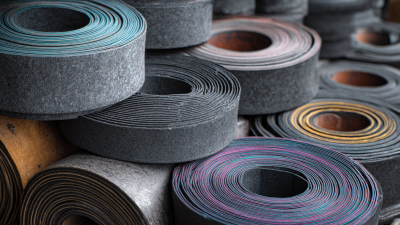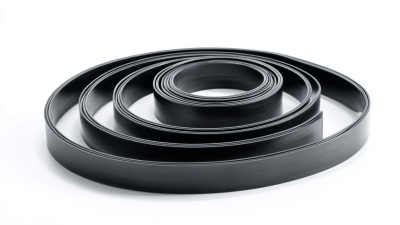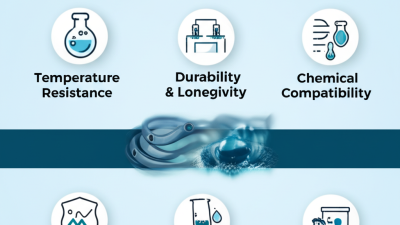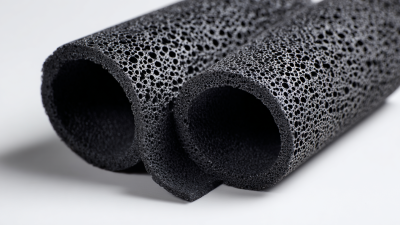How to Choose the Right Fpm Gasket Material for Your Industrial Applications
Table of Contents
- Understanding the Importance of Selecting the Right Fpm Gasket Material
- Key Factors to Consider When Choosing Fpm Gasket Materials
- Common Types of Fpm Gasket Materials and Their Properties
- Comparing Fpm Gasket Materials for Different Industrial Environments
- Best Practices for Testing and Evaluating Gasket Material Performance
- Cost Considerations and Budgeting for Fpm Gasket Materials in Projects
- Exploring the Versatility and Applications of Raw Gum FVMQ Base Polymer in Modern Industries
- FAQS
- Conclusion
- Related Posts
Picking the right FPM gasket material is a pretty big deal if you wanna keep things running smoothly and reliably in industrial settings. As demand for top-notch sealing solutions keeps climbing, the global gasket materials market is expected to hit around $80 billion by 2025—thanks to tech improvements and more industrial activity everywhere.
Companies like Sichuan Fudi New Energy Co., Ltd. have been in the game for over 20 years, focusing on making and selling fluoroelastomer and other fluorinated rubber materials. They've really carved out a name for themselves.
 Their products—like FKM/FPM precompounds and fluorosilicone rubber—are made to handle super hot temperatures and tough chemicals, making them perfect for industries like automotive, aerospace, and oil & gas. Choosing the right FPM gasket material isn’t just about performance; it’s also about making sure the equipment lasts longer and works better overall. At the end of the day, it’s all about meeting industry needs for reliability and efficiency—and that’s what really counts.
Their products—like FKM/FPM precompounds and fluorosilicone rubber—are made to handle super hot temperatures and tough chemicals, making them perfect for industries like automotive, aerospace, and oil & gas. Choosing the right FPM gasket material isn’t just about performance; it’s also about making sure the equipment lasts longer and works better overall. At the end of the day, it’s all about meeting industry needs for reliability and efficiency—and that’s what really counts.
Understanding the Importance of Selecting the Right Fpm Gasket Material
Picking the right FPM gasket material for industrial settings isn’t something to take lightly — it really affects how smoothly your operations run and how safe everything is. When you’re choosing, you wanna think about stuff like chemical compatibility, how well it can handle high temperatures, and whether it seals properly. Industry folks have pointed out that using the wrong gasket material can actually cause equipment failures. And, get this — in some sectors, downtime from these issues can cost a staggering $22,000 per hour! That’s why knowing your materials inside out is so important if you want reliable, long-lasting sealing solutions.
Here at Sichuan Fudi New Energy Co., Ltd., we've got more than 20 years of experience working with fluoroelastomers and fluorinated rubbers. We offer a pretty wide range of high-performance products, including FKM compounds designed for all sorts of industrial needs. Fluoroelastomers are especially impressive because they can withstand a vast array of chemicals and extreme temps — perfect for tough environments. As industries keep pushing towards better reliability and sustainability, picking the right FPM gasket material isn’t just about boosting productivity; it’s also about ensuring safety and making sure your equipment lasts longer across different applications.
Choosing the Right FPM Gasket Material for Industrial Applications
This chart illustrates the properties of various FPM gasket materials used in industrial applications, highlighting their tensile strength, temperature resistance, and chemical resistance. Selecting the right material is crucial for ensuring optimal performance and longevity.
Key Factors to Consider When Choosing Fpm Gasket Materials
When you're trying to pick the right FPM gasket material for industrial use, there are a few key things to keep in mind. First off, the temperature range is a big deal. FPM gaskets are pretty awesome when it comes to handling heat—they can usually take temperatures from about -20°C all the way up to 200°C. That makes them perfect for high-temp environments, like in oil and gas industries, where stuff tends to get pretty hot. Plus, they’re really resistant to chemicals. Most FPM materials can hold up against a wide array of nasty chemicals, oils, and fuels without much trouble.
Another important point is making sure the gasket material plays well with the fluids it's going to come into contact with. For example, if you're working with hydraulic systems, you'll want to ensure the FPM type you choose doesn't degrade over time. From what industry folks have been saying, advanced fluoroelastomers can really help cut down on maintenance costs and prevent unexpected downtime since they tend to wear less over the long haul.
A quick tip: when you're selecting FPM gaskets, don’t forget to check the technical specs carefully—make sure they match your temperature needs and chemical situation. Also, think about the mechanical stresses or movements in your system. Some FPM varieties are more flexible and durable when things are constantly shifting or under pressure.
By the way, Sichuan Fudi New Energy Co., Ltd. has been around for over twenty years, providing top-quality fluoroelastomer and fluorinated rubber solutions. They really know their stuff—helping manufacturers get reliable, industry-standard materials that you can count on.
Common Types of Fpm Gasket Materials and Their Properties
When you're choosing the right FPM gasket material for industrial stuff, it’s pretty important to get a handle on the common types out there and what they’re good for. FPM, which is short for fluoropolymer, is loved for its awesome resistance to chemicals, good thermal stability, and long-lasting durability. The most popular options you’ll come across include VITON™, known for handling high temperatures like a champ, and other blends that are more flexible and great at sealing, especially at lower temps.
A quick tip—think about the environment your gasket’s gonna face. If it’s up against tough solvents or oils, make sure the FPM material you pick is compatible enough to stand up to those things without breaking down.
There’s also special kinds of FPM out there—like those specifically mixed for certain industrial needs. Some are food-grade certified, while others are designed to resist fires better. These little details can really make a difference in how long your gasket lasts and how well it works. So, it’s worth spending a bit of time figuring out exactly what your application needs before you decide.
And don’t forget—chatting with your supplier can be a game changer. They have the inside scoop on different compounds and can help you find the best fit for your specific situation. That way, you’ve got a better shot at choosing something that truly works for you.
Comparing Fpm Gasket Materials for Different Industrial Environments
Whenever you're picking out FPM gasket materials for industrial use, it’s super important to really get a feel for the environment they'll be operating in. I mean, different factories or plants expose gaskets to all sorts of chemicals, temps, and pressures—so what works in one place might not cut it in another. According to the 'Gasket Materials Selection Guide' from the Rubber Manufacturers Association, FPM (that’s Fluoroelastomer) gaskets are pretty fantastic when it comes to resisting chemicals, especially hydrocarbons and other nasty fluids. That’s probably why they’re such a hit in the oil and gas sectors. Actually, a report I saw from Technavio mentioned that globally, the demand for FPM gaskets in chemical processing is expected to grow by over 5% each year—that just goes to show how crucial they are for keeping systems running smoothly.

And here's another thing—temperature resistance is a big deal, too. Most FPM gaskets can handle up to around 200°C (which is like 392°F), and some of the newer versions can handle even higher temps. That’s a game-changer for industries like pharma or food processing, where the temperatures can swing quite a bit. A study published in the Journal of Materials Science even pointed out that choosing a gasket with the right thermal properties can really prevent failures and boost efficiency, especially when dealing with high heat environments. So, yeah, if you’re comparing different FPM gasket options, taking a close look at the specific conditions of your industry is key—doing that homework pays off in the long run for performance and durability.
Best Practices for Testing and Evaluating Gasket Material Performance
When you're picking out the right FPM gasket material for industrial stuff, it’s super important to really look into how well the material performs and how reliable it is. The best way to do this is by following certain testing steps—like checking if it plays nicely with the chemicals it’ll be exposed to, making sure it can handle the right temperatures, and verifying its mechanical strength. Basically, gaskets need to be tough enough to handle the pressure and heat they'll face in real-world use, and they should stay in good shape over time without failing.
Here at Sichuan Fudi New Energy Co., Ltd., we’re all about providing top-quality fluoroelastomer materials. These have proven themselves time and again in those tough tests. With more than 20 years under our belt working with fluoroelastomer base polymers and FKM compounds, we really get how important it is to rigorously test our products to make sure they perform perfectly in demanding industrial environments.
Using our specialized fluorosilicone rubber and curing agents, we offer custom solutions tailored to different needs—helping your equipment run smoothly and last longer, even in tough conditions.
Cost Considerations and Budgeting for Fpm Gasket Materials in Projects
When you're budgeting for FPM gasket materials in industrial settings, it’s really important to think about both the price and the quality. Lately, if you’ve been keeping an eye on the market, you’ll notice that high-quality FPM gaskets—like those made from fluoroelastomers—are available at pretty competitive prices. For example, you can find custom O-rings for around 25 cents each. But here’s the thing: you wanna make sure that the materials you pick not only fit into your budget but also meet the tough requirements of your specific application. It’s all about balancing cost with performance.
Also, going with reliable suppliers who have a solid reputation—think companies with tons of experience in fluoroelastomer manufacturing—can really pay off over time. Take Sichuan Fudi New Energy, for instance; they’ve been around for over 20 years and offer everything from basic polymers to specialized compounds. That kind of variety helps you choose materials that give you the best durability and performance for your project. In the end, investing a little more upfront in good-quality materials can save you a lot on maintenance and avoid costly downtime down the road.

Exploring the Versatility and Applications of Raw Gum FVMQ Base Polymer in Modern Industries
In the realm of modern industries, the versatility of raw gum FVMQ base polymer is increasingly recognized for its numerous applications. This unique copolymer, derived from methyl-3,3,3-trifluoropropylsiloxane and a vinyl monomer, offers a compelling solution for various sectors, including automotive, electronics, and healthcare. The exceptional thermal stability and chemical resistance of FVMQ make it ideal for applications requiring reliability under extreme conditions, ensuring long-lasting performance in demanding environments.
When considering the specific properties of this copolymer, molecular weight and vinyl content are crucial factors that influence its applicability and performance in different formulations. Manufacturers seeking to optimize their products can leverage our expertise to receive the most suitable grade for their unique requirements. We encourage inquiries to further discuss your needs, whether you need guidance on molecular weight specifications or assistance with vinyl content adjustments. To facilitate your exploration of our product, we offer free stock samples, enabling you to evaluate the quality and functionality of our FVMQ base polymer before making a commitment. Feel free to reach out with any questions or orders you may have.
FAQS
: FPM gaskets, or fluoroelastomer gaskets, are known for their excellent chemical resistance and are primarily used in industries such as oil and gas and chemical processing.
FPM gaskets can typically withstand temperatures up to 200°C (392°F), with some variants designed for even higher limits, making them suitable for industries with varying process temperatures.
Different industrial environments expose gaskets to various chemicals, pressures, and temperatures, which significantly influences the choice of material for optimal performance and longevity.
Best practices include assessing chemical compatibility, temperature tolerance, and mechanical properties to ensure gaskets can withstand the specific conditions they will encounter.
Investing in high-quality FPM gaskets can lead to long-term savings by reducing maintenance costs and downtime, even if the initial investment is higher.
Sichuan Fudi New Energy Co., Ltd. is a company specializing in the production of high-quality fluoroelastomer materials, offering tailored solutions that ensure optimal performance in various industrial applications.
Chemical compatibility is crucial as it ensures that the gasket material can resist the specific chemicals it will be exposed to in its intended environment, preventing failures.
The demand for FPM gaskets, particularly in chemical processing, is expected to grow at a rate of over 5% annually, highlighting their importance in maintaining system integrity.
When budgeting, it's essential to balance cost and quality, ensuring that materials fit within the budget while meeting stringent application requirements.
Rigorous testing ensures that gasket materials meet necessary performance standards, which is essential for maintaining integrity under the pressures and temperatures they will face in industrial applications.
Conclusion
When you're choosing the right FPM gasket material for industrial use, it’s really important to understand just how much your choice can affect both how well the gasket performs and how long it lasts. Think of factors like temperature tolerance, chemical compatibility, and mechanical strength—these can vary quite a bit depending on the type of FPM gasket you're considering. Doing a side-by-side comparison of different materials across various industrial settings can help you find the perfect match for your specific needs.
And don’t forget, following best practices for testing and evaluating these gasket materials is key to making sure they’re reliable and efficient in the long run. Of course, cost plays a big role too—ballparking your budget early on can really influence overall project success.
Here at Sichuan Fudi New Energy Co., Ltd, we draw on over 20 years of experience in making fluoroelastomers to deliver top-quality FPM gasket materials tailored for a wide range of industrial applications. Our goal is to help you get the best performance and value out of your sealing solutions, without the fuss.
Related Posts
-

How to Source Chemours FKM for Enhanced Performance in Your Applications
-

Ultimate Guide to Understanding the Benefits of Fkm Rubber in Industrial Applications
-

What is Oring De Viton Parker and How It Enhances Sealing Performance in Various Industries
-

7 Reasons Why FKM Is Viton the Best Choice for Your Industrial Needs
-

Top Strategies for Boosting Efficiency with Material Fkm Viton in Industrial Applications
-

The Future of Viton Sponge Rubber in Innovative Industrial Applications

Oliver
-

Phone
-

E-mail
-

Whatsapp
-

Top




